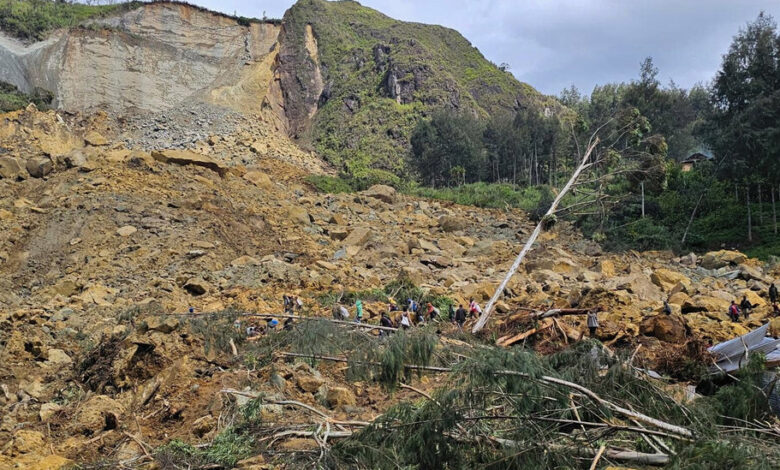Hundreds of people died from landslides in Papua New Guinea

Unstable rubble and debris were complicating search and rescue efforts in rural Papua New Guinea on Saturday, a day after a massive landslide buried villages and killed at least at least three people. Local officials said the death toll could reach at least hundreds.
Nearly 4,000 people live in 3 villages submerged by a landslide Sandis Tsaka, the provincial administrator for Enga, which covers the affected area, said early Friday. He said the death toll is likely to be high because the landslide occurred in a densely populated area and is also a corridor with high traffic.
“Our people will consider it biblical,” he said. “We are seeking all the help and support we can get to address a humanitarian disaster of unprecedented proportions in this part of the world.”
Prime Minister James Marape said in a voice message that although the death toll was still unknown, the disaster could be the country’s largest landslide.
“This year we have experienced prolonged and unusual rains in most parts of the country, causing floods and landslides,” he said. “It was a densely populated village and the entire village was submerged.”
According to Mr. Tsaka, three bodies were pulled from the rubble on Friday and five people, including a child, were treated for injuries.
The disaster occurred around 3 a.m., catching most residents off guard and causing giant boulders, some larger than shipping containers, to fall. Mr. Tsaka said at least 60 homes were buried under up to 20 feet of rubble. He said at least a 500-foot section of the Porgera Highway, the main route connecting the area, was flooded.
Serhan Aktoprak, head of the International Organization for Migration’s office in Papua New Guinea, said the landslide buried an area equivalent to about three or four football fields. He said a humanitarian aid convoy, after some delays, arrived in the affected villages on Saturday afternoon to provide cloth and water.
The villages are populated mainly by subsistence farmers and are located in the highlands of Papua New Guinea, an island nation in the Pacific Ocean north of Australia. The province has been affected in recent months by Deadly conflicts escalate between tribal groups.
The aid convoy was delayed by a blockade set up by one of the groups involved in the conflict and was only allowed to pass after the military stepped in, Mr. Aktoprak said, making slowing down relief efforts when time is critical. He noted that daylight hours are getting shorter in the Southern Hemisphere, with the sun setting just before 6 p.m.
“Every minute that passes essentially reduces our chances of reaching them alive,” he said.
Mr. Tsaka, the provincial official, said the area is more prone to small landslides and in recent months the weather has been consistently wet.
Heavy rain is forecast to continue to hit the area in the coming days, further hindering rescue efforts. According to Mr. Tsaka, international organizations and the country’s defense forces have come to help.
Michael Main, an anthropologist who studies tribal violence in Papua New Guinea, said the country’s population is seeing rapid growth, especially in resource-rich places like the affected areas. affected by landslides, near Porgera gold mine. The country’s tropical highlands, with heavy rainfall, frequent tectonic activity and unstable geology, are prone to landslides, he said.
“The villages here are expanding and there are simply more people and more houses spread across the landscape,” said Dr Main, a researcher at the University of Melbourne’s Peacebuilding Initiative. mandarin”. “So many people will be affected by these events.”
President Biden said in a statement Friday that the United States stands ready to support rescue and recovery efforts. Australia’s foreign minister, Penny Wong, also said in a statement that her country was ready to respond to requests for assistance.
Vincent Pyati, president of the local Community Development Association, said the area is a transport node where many people from remote areas come overnight to catch public transport, a popular mode of transportation. Popular transfers, which may increase tolls. He said there is also a drinking club that is popular with people throughout the district.
Pyati said at least 300 people were estimated to have died.



